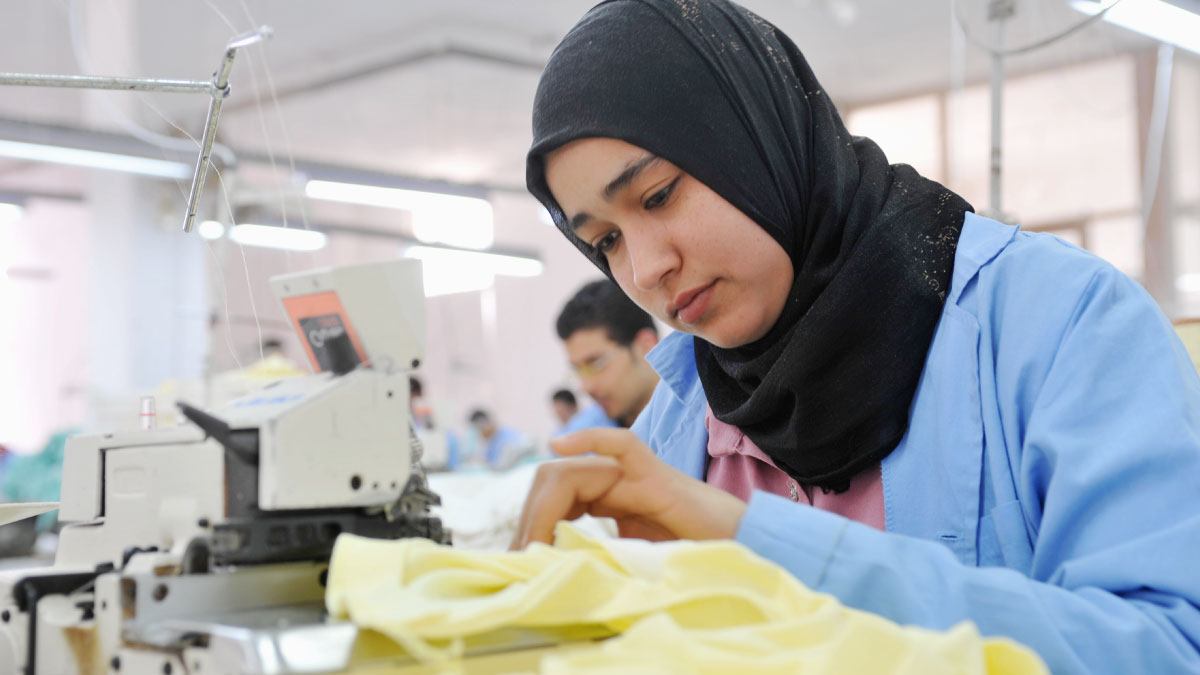UNCTAD helps strengthen international trade statisticians’ skills and capacity, for a continuous flow of high-quality statistics amid pandemic-induced disruptions to data supply.
A seamstress in Egypt. Policymakers need better indicators to shed light on gender issues in trade. Copyright: ILO/Marcel Crozet
UNCTAD held a series of sessions during the World Statistics Congress 2021 to help improve data and statistics for the analysis of COVID-19’s impacts on societies, economies and the planet, and advance progress towards the 2030 Agenda for Sustainable Development.
Organized by the International Statistical Institute, the congress held online from 11 to 16 July underlined the importance of reliable, timely and readily available data and statistics for an inclusive recovery from the pandemic. It took place under the theme “Statistics and data science for a better world”.
“Policymakers need timely economic data and more granular information to detect inequalities that may have been exacerbated by the health crisis,” said UNCTAD senior statistician, Anu Peltola.
“Also, more transparency is needed on financial leakages, especially illicit financial flows, to harness resources for an equitable recovery,” she added.
UNCTAD’s sessions during the event examined how to tackle these challenges and use online training approaches to strengthen international trade statisticians’ skills and capacity, for a continuous flow of high-quality statistics amid pandemic-induced disruptions to data supply.
Nowcasting the pandemic’s impacts
The pandemic has caused economic volatility, with historic contractions quickly followed by historic expansions. In these conditions, Ms. Peltola said, decision makers in governments and companies struggle to maintain an accurate view of the economy.
In 2020, interest in nowcasting grew substantially. Nowcasts combine the timeliest data from various sources, including big data, with official figures published with longer delays. In 2020, published papers on Google Scholar referring to nowcasting grew by almost 30% compared with 2019.
UNCTAD’s session on nowcasting highlighted both methodological advances in the field and real-world empirical applications.
Beyond the pandemic, nowcasting can significantly contribute to the Sustainable Development Goals (SDGs). “In the right context, nowcasting can be a powerful tool in measuring SDG indicators, filling gaps in data quality or timeliness,” said Fernando Cantú, chief statistician at the UN Industrial Development Organization.
Need for a keen focus on gender inequality
The pandemic has exacerbated imbalances and disrupted progress towards the 2030 Agenda, making it crucial to keep an eye on inequalities. “International trade affects these imbalances with differentiated impacts across society, including on women and men,” Ms. Peltola said.
She said policymakers need better indicators to shed light on gender issues in trade and answer questions such as: What is the share of men and women in trading firms’ labour force? Is there a difference in their education, jobs and wages? Is the gender pay gap different in trading and non-trading companies? Does that vary by industry or employer?
“Answers to these questions help target measures to address gaps and assess policy effectiveness,” Ms. Peltola said.
To discuss emerging initiatives, research and statistics on gender in trade, UNCTAD organized a session entitled “Gender, entrepreneurship, and trade – integrating data for better insights”.
“As gender has a strong explanatory power, official statistics should present gendered breakdowns for trade,” said Henri Luomaranta, head of statistics at Statistics Finland.
He added: “Statistical offices can do more to help policymakers by integrating existing data in a cost-effective way. Governments should invest in data infrastructure that allow linking of data across topics.”
Illicit financial flows are too important not to be measured
UNCTAD also held a session on measuring illicit financial flows (IFFs) in official statistics. It presented a conceptual framework, methodological guidelines and countries’ experiences on measuring IFFs.
IFFs are a serious problem for financing development as they drain capital and tax revenues and divert funds from social spending. They’re not easy to track, but they leave some traces in records held by various agencies.
UNCTAD and the UN Office on Drugs and Crime, as custodians of an SDG indicator on IFFs, have developed tools and methods for government authorities to measure IFFs.
The speakers of the session urged countries to test the measurement of IFFs to refine methods, noting that “it will not only provide clarity on the scope of the IFFs but also help improve the quality of key statistics such as GDP.”
Revolution in virtual training in statistics
The congress provided a unique opportunity for UNCTAD to share its experience and learn from related online training approaches in a session entitled “New developments in delivering training on official statistics”.
Online training has enabled capacity-building for statisticians during the pandemic. Courses can be rolled out to the entire world, connectivity allowing, including to the remotest countries where statistical systems may be weaker.
But it faces challenges such as the lack of certain technical equipment and a reliable internet connection and reduced interpersonal interaction.
UNCTAD offers two dedicated online courses within its TrainForTrade programme, jointly with the UN Statistics Division and the World Trade Organization.
Peter Everaers, a former director at Eurostat, said increased online training is “both an evolution and a revolution in the training of official statistics.”
He said the evolutionary elements include the increasing need for internationally comparable statistics, especially under the 2030 Agenda, and new opportunities arising from data science.
“At the same time, it is a revolution forced by the pandemic as countries need even more support for their statistical work due to the disruptions it has caused,” Mr. Everaers said.
The proceedings of several UNCTAD sessions during the congress will be published in the Statistical Journal of the International Association of Statistics in the coming months.

